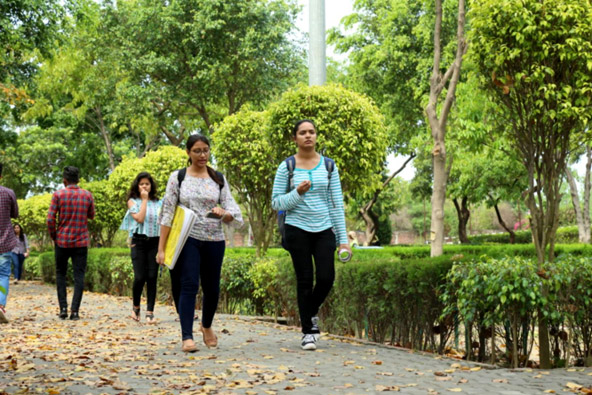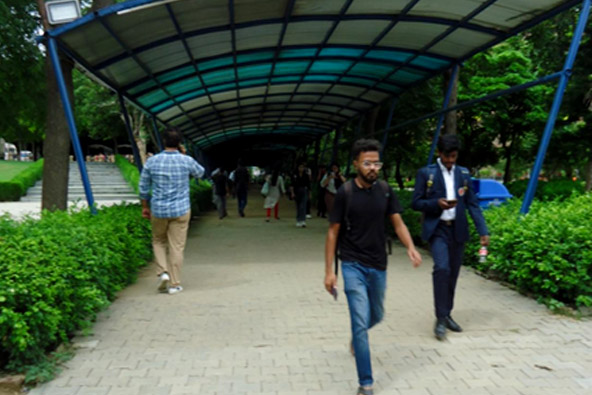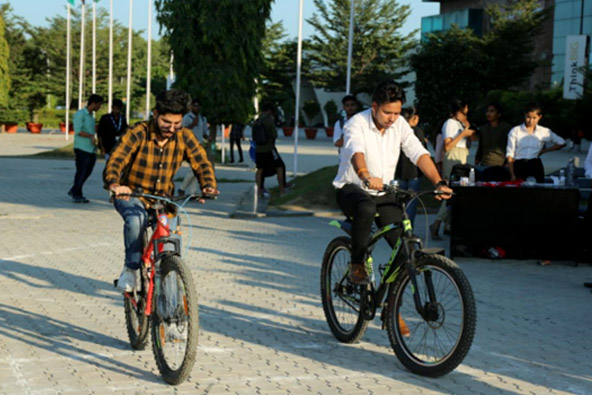Lovely professional university plans and builds the infrastructure so that it is sustainable, causes minimum or no harm to environment and promotes sustainable commuting that includes safe walking, cycling, car pools, bus services use of electric vehicles like golf karts etc. To reduce carbon footprint
Lovely Professional University, in line with global sustainability goals and to promote eco-friendly commuting options has measure and set targets for more sustainable commuting (walking, cycling or other non-motorized transport, vanpools, carpools, shuttlebus or public transportation, motorcycle, scooter or moped, or electric vehicles), LPU has set some goals and targets through implementing certain directives, promotions, enhanced infrastructure, community participation etc. Following is the list of targets that Lovely Professional University aims to achieve in the near future
- Enhancing Infrastructure for Non-Motorized Transport: In addition to the already existing pedestrian walkways and pedestrian friendly traffic in the campus, the university is planning to add dedicated bike lanes and secure parking facilities for bicycles and scooters to encourage more students and faculty to opt for non-motorized transportation.
- Promotion of Electric Vehicles (EV's): Lovely Professional University has set a target for increasing the number of in-house electric vehicles, planning for charging stations on campus and encouraging the use of electric cars, scooters, and bicycles.
- Shuttle Bus Service: Lovely Professional university has a shuttle bus service that connects the campus with nearby areas and public transportation hubs, reducing the need for private vehicles and promoting the use of public transport among students, faculty, and staff. The university is in process of replacing all the diesel operated buses with E-Buses.
- Encouraging Carpooling: Lovely Professional university is planning to introduce incentive programs for carpooling, such as designated parking spaces for shared vehicles, or other benefits to encourage more people to share rides and reduce the overall number of vehicles commuting to the university.
- Partnerships with Public Transportation Authorities: The University is proposing collaboration with local public transportation authority to improve the frequency and accessibility of public transport options connecting the university to different parts of the city or region, encouraging more students and faculty to use public transportation for their daily commute.
Targets:
- Less use of cars on campus
- Use of bicycles, e-golf karts
- Commutation by walking
- Use of car-pools
- Use of public transport by buses
- Preference of electric cars and e-bikes
- Free shuttle service for easy commutation from LPU main gate to centre of Campus
Measurement of data of the set targets:
- Use of bicycles is tracked by mobile app
- 90% of student commutation is by e-golf karts in the campus
- Nearly 70% staff commutes by pooling (car, bike, etc.) that reduces parking space
- Local students and staff uses University buses for travel
- With growing e-vehicle market, staff and students are preferring e-cars and e-bikes.
- Pedestrian walkways for movement inside campus
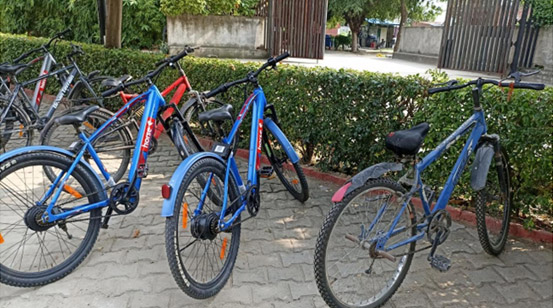
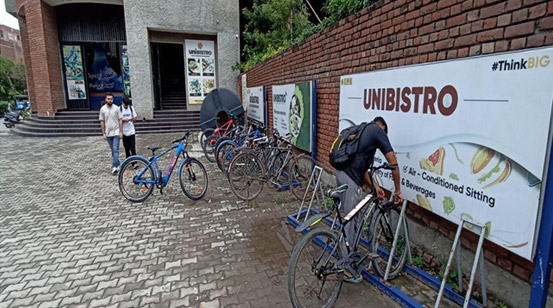
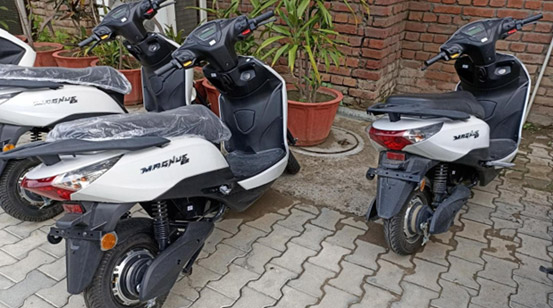
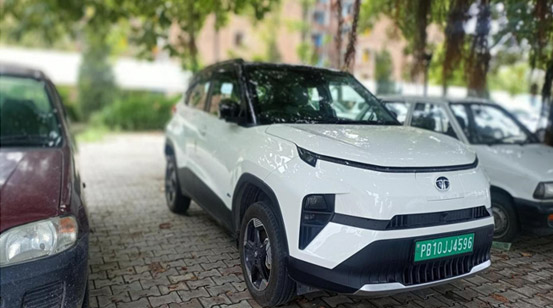
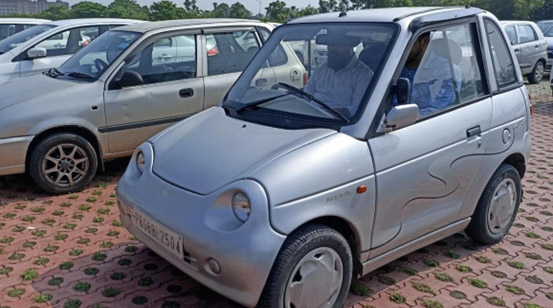
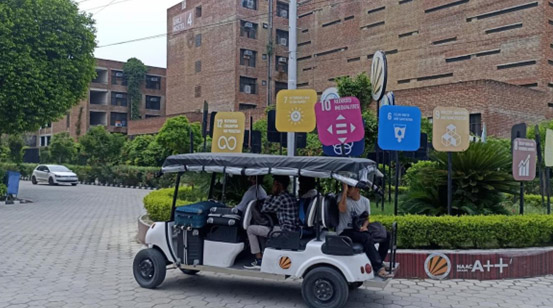
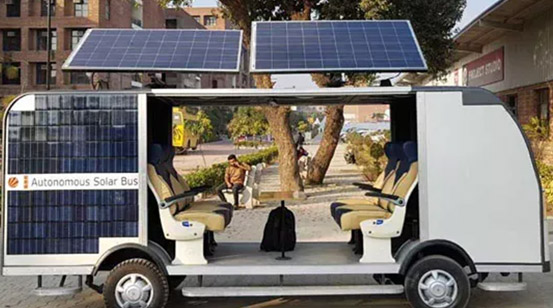
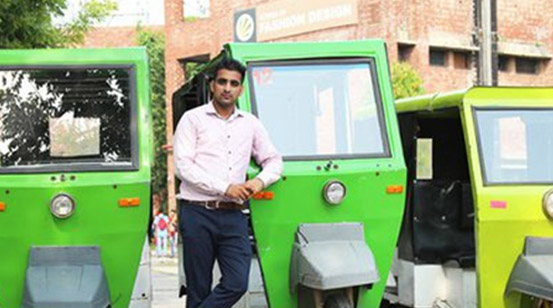
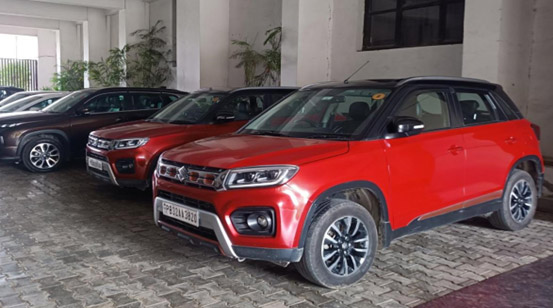
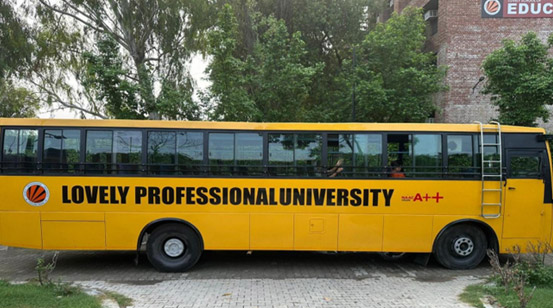
LPU’s Sustainable Shuttle Service for Students, Faculty, and Staff
Lovely Professional University demonstrates its commitment to sustainability and encourages its students, faculty, and staff to adopt more eco-friendly commuting practices, thereby contributing to a greener and more environmentally conscious campus community. The university has a dedicated shuttle service for students, faculty and staff thereby reducing the overall carbon footprint because of commuting. Following are the details of the University shuttle services and the number of beneficiaries for the same.
| S.No. | University Transport Details | Count |
|---|---|---|
| 1. | University owned Buses | 0 |
| 2. | Hired Buses | 10 |
| 3. | Tempo Travelers | 1 |
| 4. | Cars | 17 |
| 5. | Ambulances | 6 |
| 6. | Golf Cart | 35 |
| 7. | Total Driver | 21 |
Pedestrian friendly pathways
Average Faculty and staff running in bus per month 164.
No. Of Students - 350
Apart from these daily shuttle bus services, the university also facilitates its students and staff by providing them shuttle buses/cars for any outstation visits or site visits etc. On an average about 110 student trips are organized per month by the university with daily on call services for the Lovely Professional University.
Bicycle commutation in the campus
Lovely Professional University promotes sustainable and eco-friendly commuting through its innovative green mobility initiatives. Since January 2018, LPU has partnered with Hero Cycles to introduce a campus-wide bicycle-sharing program, earning recognition as India’s first Bicycle Friendly University. With nearly 600 bicycles and over 15 parking stations, the initiative enables around 4,000 students daily to adopt healthy, zero-emission transport. Strengthening this vision, LPU collaborated with HORSE in 2023 to launch a pilot project featuring 150 electric cycles and eight new docking stations. Complemented by golf carts and other electric vehicles, these initiatives not only reduce carbon emissions and traffic congestion but also instill environmental consciousness and sustainable commuting habits among students. For more information click here
E-golf karts for in campus mobility
Electric mobility has changed with rapid developments in energy and charging systems. As a milestone towards low cost and eco–friendly transport, LPU has opted for this mode of shared fixed route mobility for transport at reasonable prices. The e–golf kart, in LPU, comprises of high-quality vehicles with advanced electric system, a fast charging and long range as well as a tech–enabled platform which connects students and drivers and has an intelligent route planning mechanism developed by Deepak Dhayal, a B. Tech. (Mechanical Engineering) student of LPU, who deserves the credit for this. Initially, the venture started with 2 e–rickshaws in late 2015 and today, there are 10 e–golf karts are running successfully, inside the campus, supporting to keep the campus environment friendly and pollution free. Facts related to Eco–friendly E–golf karts:
1. No emission vehicles, whereas average 4–Seater Diesel vehicle emits about 4.6 metric tons of CO2 per year, thus, improving the air quality.
2. It leads to the decrease in the emission of Green House Gases.
3. It does not contribute to acid rain.
4. This helps in reducing expensive oil consumption.
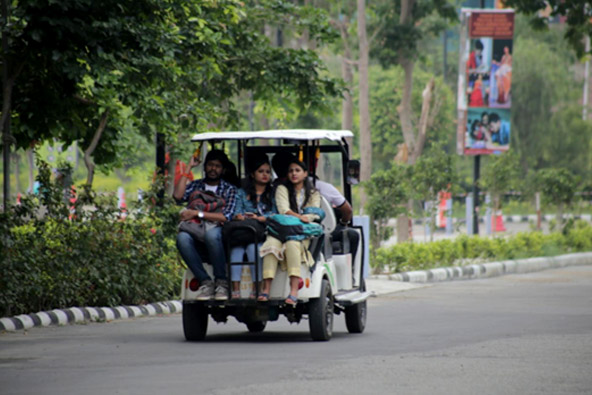
Grass paver parking
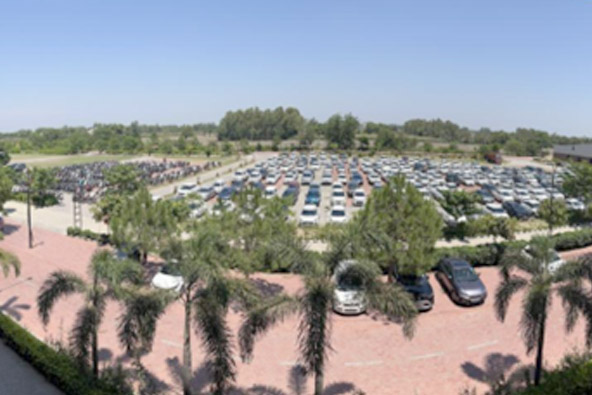
Concrete paver tiles
